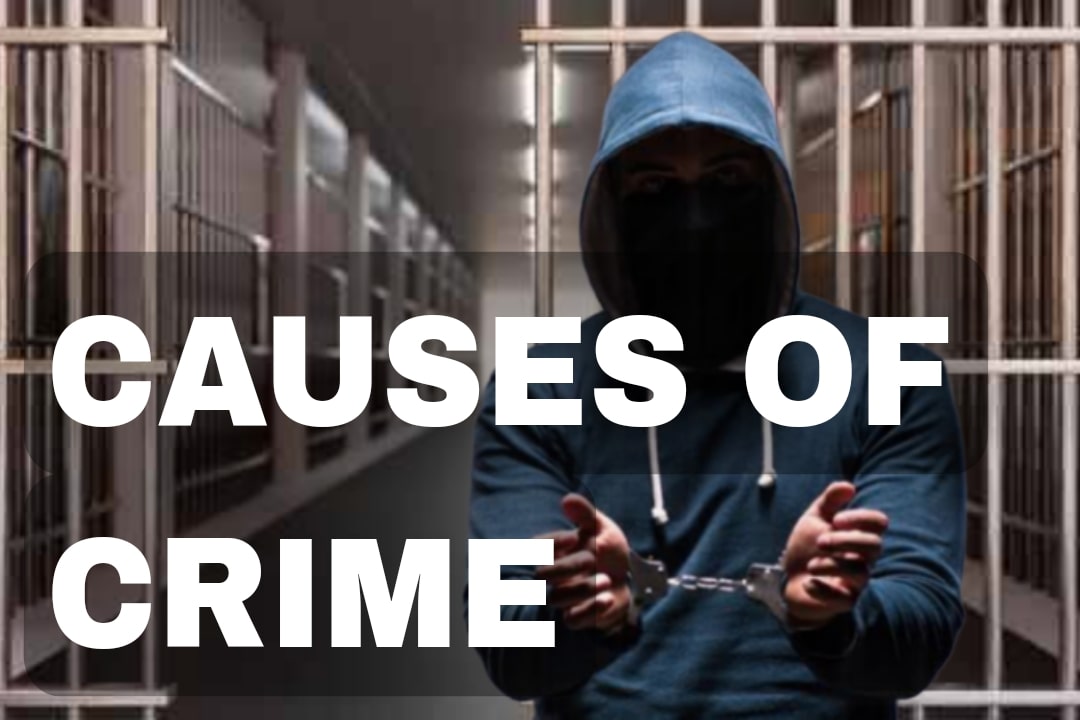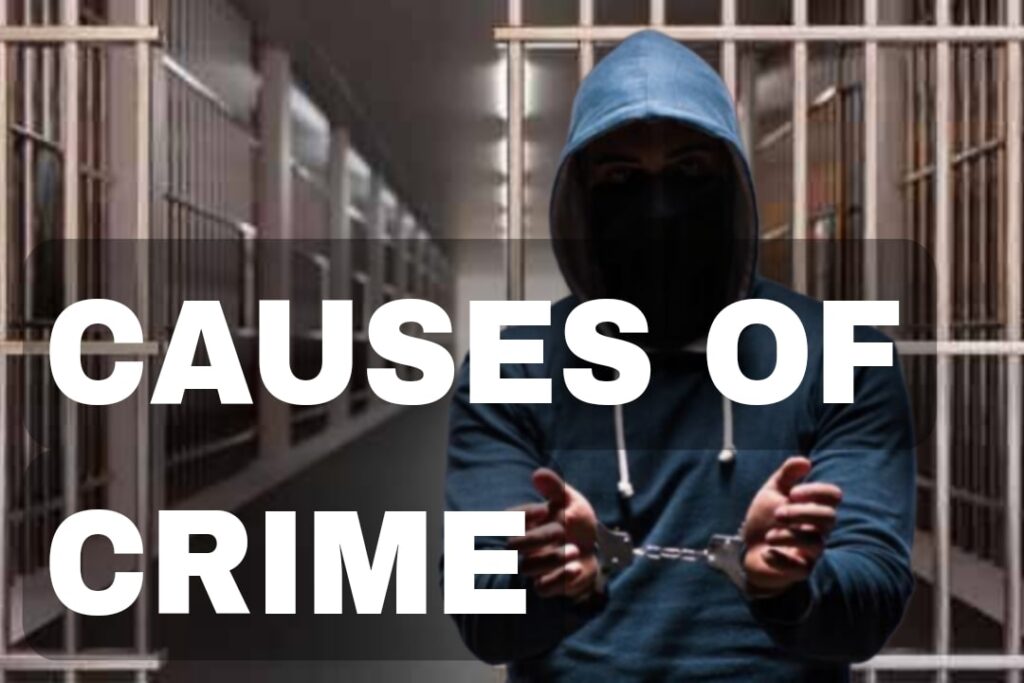Criminal Behavior and the Causes of Crime


Introduction
The study of crime and criminal behavior has fascinated scholars, psychologists, and sociologists for centuries. What prompts some individuals to engage in unlawful activities while others adhere to societal norms? Understanding the motivations behind criminal behavior is a complex task that requires an examination of psychological, sociological, and economic factors. This article aims to shed light on the nature of crime by exploring the different motivations that drive people to become criminals.
Psychological Motivations
Psychological motivations play a vital role in comprehending criminal behavior. These motivations delve into an individual’s internal mental, emotional, and cognitive aspects that influence their decision to engage in illegal activities. Here are some key psychological motivations frequently examined in the context of criminal behavior:
Personality Traits: Certain personality traits, such as impulsivity, seeking sensation, and lacking empathy, can predispose individuals to criminal behavior. Impulsive individuals may act without considering the consequences, while sensation-seekers might participate in risky activities for the thrill. A lack of empathy can result in a disregard for others’ well-being, making it easier to commit crimes.
Psychological Disorders: Individuals with certain psychological disorders may be more prone to criminal behavior. Disorders like antisocial personality disorder, conduct disorder, and substance use disorders can impair an individual’s ability to control their behavior, leading to a higher likelihood of engaging in criminal acts.
Cognitive Distortions: Cognitive distortions are biased thought processes that can rationalize or justify criminal behavior. These distortions might involve minimizing the seriousness of the crime, blaming others for one’s actions, or believing that the crime is the only available option. Cognitive distortions can reduce feelings of guilt and make it easier for individuals to engage in criminal activities.
Coping Mechanisms: For some individuals, criminal behavior can serve as a coping mechanism to deal with stress, trauma, or emotional pain. Engaging in criminal acts may provide temporary relief or a sense of control over a situation. For example, someone who has experienced childhood abuse might turn to criminal behavior as a way to regain a sense of power.
Attachment Issues: Early attachment experiences can significantly impact an individual’s psychological development. Those who have experienced neglect, abandonment, or inconsistent caregiving in childhood might struggle with forming healthy relationships and seeking emotional support. This can lead to feelings of isolation and a higher susceptibility to engaging in criminal activities to find a sense of belonging.
Rationalization and Justification: Individuals may rationalize their criminal actions by convincing themselves that the crime is necessary, justified, or even morally right in certain circumstances. This mental process allows them to downplay the wrongdoing and maintain a positive self-image.
Self-Esteem and Identity: A person’s self-esteem and sense of identity can influence their likelihood of engaging in criminal behavior. Individuals with low self-esteem might resort to criminal activities to gain a sense of importance or control. Engaging in criminal acts can provide a temporary boost to their self-worth, even if it’s based on negative behavior.
Economic Motivations
Economic motivations are significant drivers of criminal behavior, often arising from financial pressures, disparities, and perceived opportunities. Here are some crucial aspects of economic motivations concerning criminal behavior:
Financial Desperation: Economic hardships, poverty, and lack of employment opportunities can drive individuals to engage in criminal activities out of desperation. Some may resort to theft, burglary, or fraud to meet basic needs or support their families when traditional avenues fail.
Quick Financial Gain: The allure of quick and substantial financial gain can push individuals to participate in criminal acts. Activities like drug trafficking, illegal gambling, and white-collar crimes may promise lucrative rewards that seem too tempting to resist, especially for those facing financial difficulties.
Socioeconomic Disparities: Economic inequalities within society can create a sense of injustice and drive some individuals to commit crimes in an attempt to bridge the gap between their circumstances and the wealthier segments of the population. The perception of limited opportunities can make crime appear as a viable option for upward mobility.
Unemployment and Underemployment: A lack of stable employment opportunities or being stuck in underpaid, low-status jobs can lead to frustration and resentment. Some individuals may turn to criminal activities as a way to achieve financial success that they feel is otherwise unattainable.
Limited Access to Education: Limited access to quality education can hinder individuals’ ability to secure well-paying jobs. As a result, some may resort to criminal activities that promise higher financial rewards, even if those activities come with higher risks of legal consequences.
Illicit Economies: In some cases, entire underground economies can emerge due to economic motivations. This can include activities like black market trading, smuggling, and counterfeiting, where individuals partake in illegal transactions to circumvent regulations and taxation.
Greed and Materialism: A strong desire for material possessions and societal status can drive individuals to engage in criminal activities to acquire luxurious goods, properties, or experiences that they might not be able to afford through legal means.
Social Motivations
Social motivations are influential factors that can prompt individuals to engage in criminal behavior based on their interactions, relationships, and connections within society. Here are some key aspects of social motivations when it comes to criminal behavior:
Peer Pressure and Conformity: The desire to fit in with a particular social group or gain acceptance from peers can lead individuals to participate in criminal activities that are normalized within that group. Peer pressure can overpower an individual’s better judgment, making them more susceptible to engaging in unlawful acts to maintain their social standing.
Sense of Belonging: Some individuals may lack a sense of belonging or connection in their lives. Joining criminal gangs or groups can provide them with a sense of identity and camaraderie, filling the void they may feel in other aspects of their lives.
Family Dynamics: Family environment can significantly influence criminal behavior. Growing up in households where criminal activities are prevalent or accepted can normalize such behavior and make it seem like a viable option for individuals seeking role models or approval from family members.
Social Norms and Cultural Influences: Societal norms and cultural values can shape perceptions of what is considered acceptable behavior. In some cases, criminal actions might be seen as heroic or necessary within a particular community, leading individuals to engage in such behavior based on the influence of these norms.
Need for Validation: Some individuals may have a strong need for validation and recognition from others. Engaging in criminal activities might provide a way for them to gain attention or respect, especially if they perceive that traditional avenues of achievement are unavailable to them.
Attachment Issues: Individuals who lack healthy attachment experiences during their formative years might seek out alternative forms of attachment. Criminal organizations or groups can offer a sense of community and belonging that fulfills this need, even if it comes with engagement in illegal activities.
Rejection and Exclusion: Experiencing rejection or exclusion from mainstream society can lead individuals to seek alternative paths, including criminal ones. This may arise from feelings of resentment or a desire to prove oneself to those who have marginalized or dismissed them.
Preventing and Addressing Criminal Behavior
Preventing and addressing criminal behavior requires a comprehensive approach that considers various factors influencing individuals’ choices. Here are key strategies for tackling this nuanced issue:
Early Intervention: Identifying risk factors and intervening early in individuals’ lives can prevent the development of criminal behavior. This includes providing support to at-risk youth, addressing trauma, and promoting positive influences.
Education and Awareness: Promoting education about the consequences of criminal behavior and the resources available for personal growth can deter individuals from engaging in unlawful activities. Public awareness campaigns can help shape perceptions and attitudes.
Economic Empowerment: Creating equal economic opportunities through job training, skill development, and employment initiatives can reduce economic motivations for crime, offering individuals legitimate pathways to financial stability.
Mental Health Support: Providing accessible mental health resources and addressing underlying psychological issues can prevent individuals from resorting to criminal behavior as a coping mechanism.
Community Engagement: Fostering strong communities that provide social support, mentorship, and positive role models can offer individuals a sense of belonging that deters involvement in criminal activities.
Rehabilitation: For those already engaged in criminal behavior, rehabilitation programs that address root causes, provide skill-building, and promote personal growth are crucial for reintegration into society.
Law Enforcement and Justice Reform: Effective law enforcement should focus on both prevention and intervention, incorporating community policing and restorative justice approaches that address the root causes of crime.
Addressing Systemic Issues: Tackling systemic inequalities, discrimination, and poverty can significantly reduce the motivations for criminal behavior, creating a more equitable society.
Positive Role Models: Highlighting successful individuals who have overcome adversity and achieved success through legal means can inspire others to pursue positive paths.
Holistic Approaches: Combining various strategies, such as education, economic empowerment, mental health support, and community engagement, is essential for a comprehensive approach to preventing and addressing criminal behavior.
Conclusion
Understanding the reasons behind criminal behavior entails examining psychological, sociological, and economic factors. By comprehending and addressing these motivations, we can effectively prevent crime and foster a more just and supportive society. Through social support, psychological well-being, and economic opportunities, we can reduce the appeal of engaging in criminal activities and encourage individuals to make positive choices.



